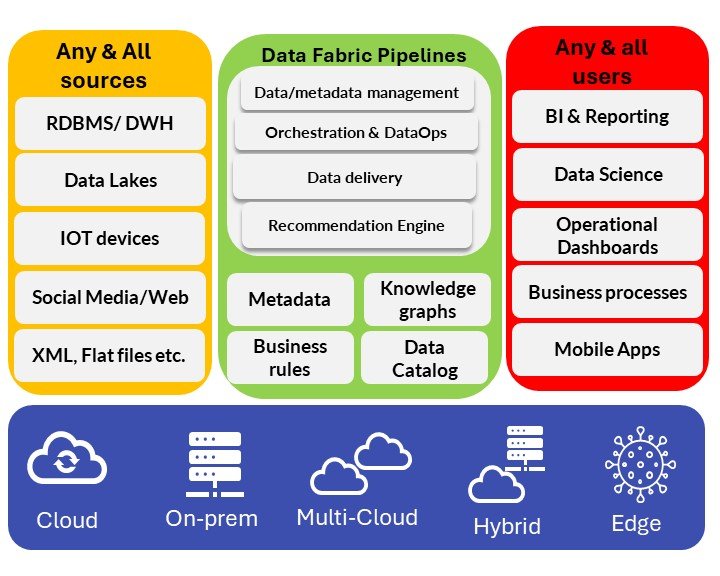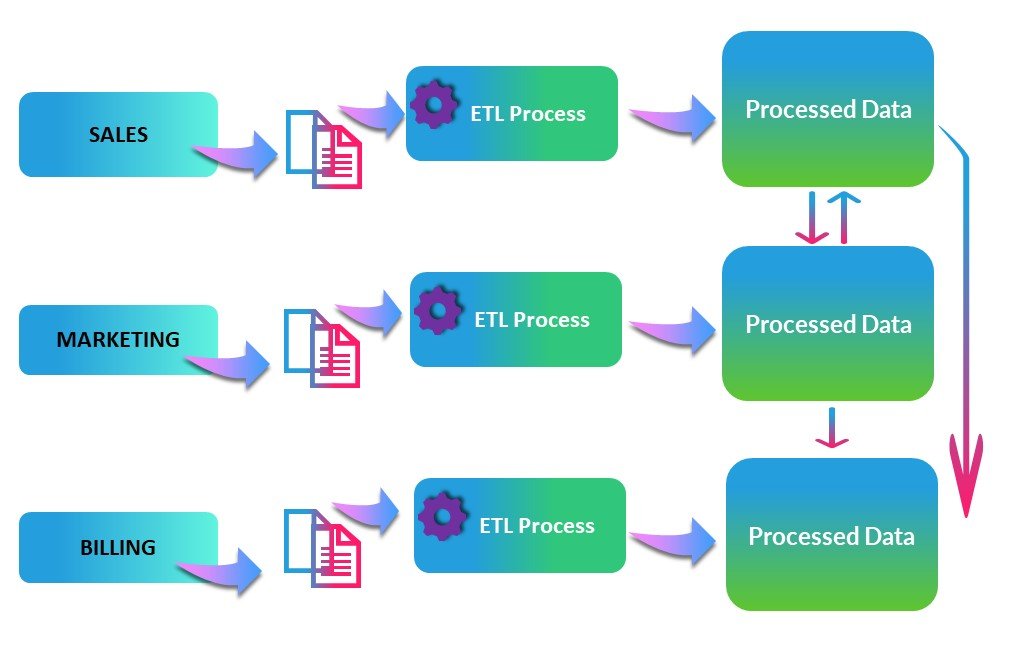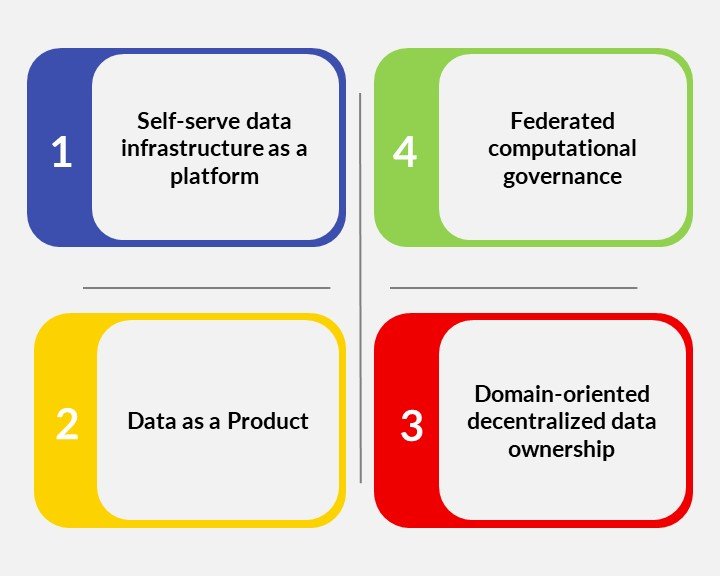Data Mesh & Data Fabric
Consultancy Support
With our expert consultancy, We use both concepts aim to enhance scalability, flexibility, and efficiency in navigating and leveraging data within complex organizational landscapes.

What is Data Fabric?
Data fabric is a concept in the field of data management that refers to an architecture and set of technologies designed to provide a unified and integrated view of data across distributed and diverse data sources. It aims to enable seamless access, sharing, and analysis of data regardless of its location or format.


Data Fabric benefits:
-
Unified Data Access:
Data fabric provides a unified view of data across disparate sources, including databases, data lakes, cloud storage, and streaming data sources.
-
Data Integration:
By seamlessly integrating data from various sources, data fabric eliminates data silos and enables organizations to gain a holistic view of their data assets.
-
Real-time Insights:
Data fabric supports real-time data processing and analysis, allowing organizations to derive insights from data as it is generated.
-
Scalability:
Data fabric architectures are designed to scale horizontally, enabling organizations to handle large volumes of data efficiently as their data needs grow.
-
Improved Data Quality and Governance:
Data fabric solutions often include features for data quality management, data governance, and compliance.
-
Cost Efficiency:
By consolidating data management processes and reducing data duplication, data fabric can help organizations optimize their data infrastructure and reduce operational costs.
-
Enhanced Data Security:
Data fabric solutions typically include robust security features to protect data against unauthorized access, data breaches, and other security threats.
-
Business Innovation:
By providing a unified and integrated view of data, data fabric empowers organizations to drive innovation and uncover new opportunities.
Why Trust Our
Data Fabric Consultancy
Data Fabric Strategy
- Assessment of Preparedness: Evaluating Your Readiness for Adopting a Data Fabric Approach
- Organisational and service design
- Assist in definition of business/data domains
- Define roadmap
- Define required services
- Governance model and approach
Data Fabric Delivery
- Operating model
- Governance model
- Service design / build
- Platform design / build
- Change management
- Data products
Data Fabric Support
- Support individual services within the Data Fabric
- Support the technical owners of the Data Fabric within a business
- Provide ongoing operational and governance support for the Data Fabric ecosystem
Talk to a Data expert!
Data mesh is a decentralized data management approach enabling business domains to define, deliver, maintain, and govern data products.
Data products integrate, process, and deliver data for use by authorized data consumers (business users, data analysts, data engineers or other systems).
Data products are easily discovered and consumed, and deliver value according to SLAs that are agreed to between data product creators and consumers.

Data Mesh benefits:
-
Scalability:
Data mesh enables organizations to scale their data infrastructure more effectively by distributing data ownership and management responsibilities across various domains or business units.
-
Improved Data Quality:
With domain-oriented data ownership, data mesh promotes accountability and responsibility for data quality within individual domains or business units.
-
Faster Time-to-Insight:
By enabling self-serve access to data for domain teams, data mesh accelerates the process of accessing and analyzing data.
-
Innovation and Experimentation:
Data mesh encourages a culture of experimentation and innovation by providing domain teams with the autonomy to explore new data sources, technologies, and analytical approaches.
-
Reduced Data Silos:
By promoting domain-oriented data ownership and self-serve access to data, data mesh helps break down data silos within organizations.
-
Cost Efficiency:
By consolidating data management processes and reducing data duplication, data fabric can help organizations optimize their data infrastructure and reduce operational costs.
-
Enhanced Data Governance and Compliance:
While decentralizing data ownership, data mesh also provides mechanisms for enforcing data governance policies and ensuring compliance with regulatory requirements.

Why Trust Our
Data Mesh Consultancy
Data Mesh Strategy
- Assessment of Preparedness: Evaluating Your Readiness for Adopting a Data Mesh Approach
- Organisational and service design
- Assist in definition of business/data domains
- Define roadmap
- Define required services
- Governance model and approach
Data Mesh Delivery
- Operating model
- Governance model
- Service design / build
- Platform design / build
- Change management
- Data products
Data Mesh Support
- Support individual services within the Data Mesh
- Support the technical owners of the Data Mesh within a business
- Provide ongoing operational and governance support for the Data Mesh ecosystem
The 4 pillars of
Data Mesh

-
Domain-Oriented Ownership:
Empowerment of teams with domain knowledge to manage their own data
-
Data as a Product:
Data is treated as a product, with clear ownership, quality standards, and access mechanisms.
-
Self Service Platforms:
Provisioning of scalable infrastructure and tools for teams to access and analyse data independently.
-
Federated Governance:
Collaborative decision-making processes to ensure data quality, privacy, and compliance across teams.

